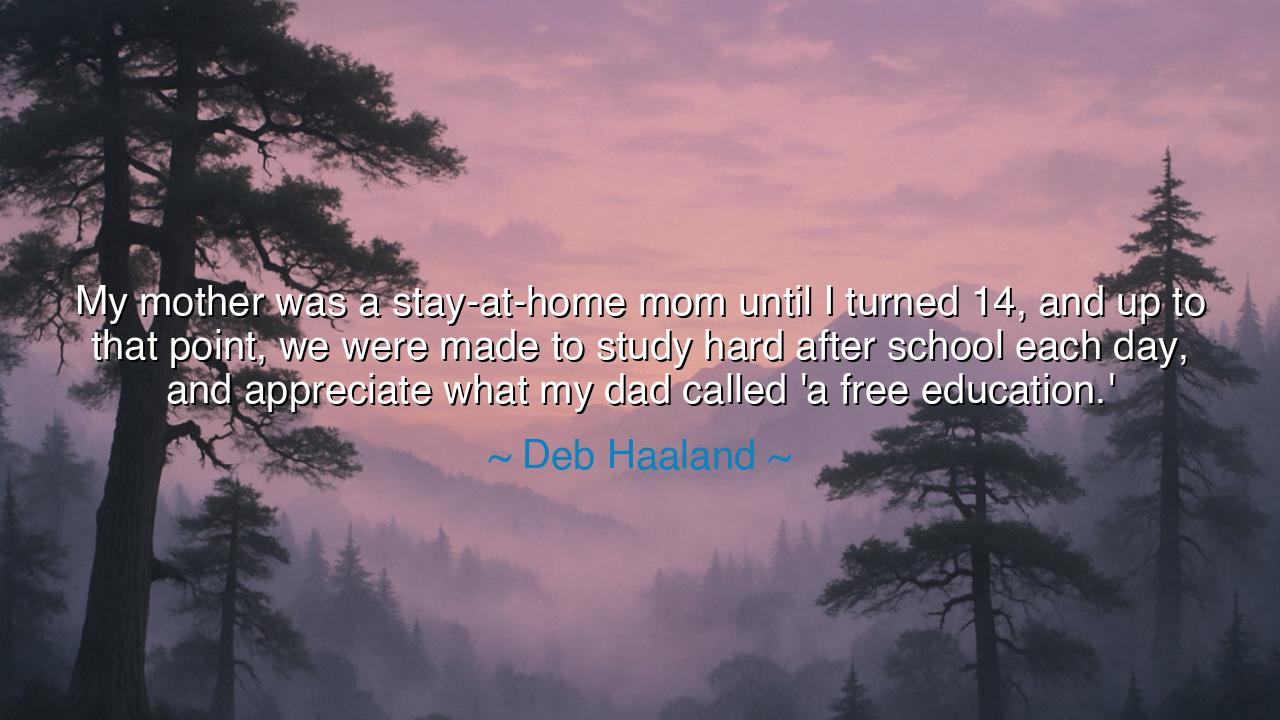
My mother was a stay-at-home mom until I turned 14, and up to
My mother was a stay-at-home mom until I turned 14, and up to that point, we were made to study hard after school each day, and appreciate what my dad called 'a free education.'






Hear, O seekers of wisdom, the words of Deb Haaland, who spoke of her beginnings with reverence: “My mother was a stay-at-home mom until I turned 14, and up to that point, we were made to study hard after school each day, and appreciate what my dad called ‘a free education.’” At first, these words sound like a memory of family routine, but in truth they are a testament to discipline, sacrifice, and the deep value of knowledge.
First, let us honor the role of the mother. A stay-at-home mom is often unseen by the world, yet she is the foundation of the household. Her work is not measured in wages but in the shaping of lives, in the meals prepared, the order maintained, the encouragement given. In Haaland’s words, we hear the echo of countless mothers who gave their strength so their children might have the freedom to learn. Such a role is not small, but heroic, though it may be hidden from the eyes of society.
Next, we see the command to study hard. After school, when many children might have run to play, Haaland and her siblings were guided to books and lessons. This was not punishment, but preparation. For her parents knew that diligence in youth becomes strength in adulthood. Study is not merely the accumulation of facts; it is the sharpening of the mind, the training of patience, the discipline that allows one to endure the storms of life.
Then comes the wisdom of the father, who called it “a free education.” In these words lies both gratitude and perspective. Too often, people treat education as a burden, a chore to be endured. But Haaland’s father taught her to see it as a treasure—something given freely, but carrying immeasurable value. He reminded his children that in many parts of the world, education is neither free nor guaranteed, and that to squander it is to squander opportunity itself.
History offers us a clear mirror. Consider the story of Frederick Douglass, born into slavery, who risked his life to learn to read and write. For him, education was not free; it was forbidden. Yet he pursued it with hunger, knowing it was the path to freedom. His example reminds us that what Haaland’s father called a “free education” is a gift many have fought and died to obtain. To treat it lightly is folly; to honor it is wisdom.
The meaning of Haaland’s reflection, then, is that the discipline of her parents, though strict, was rooted in love and foresight. Her mother’s constancy and her father’s wisdom instilled in her the understanding that knowledge is power and that education is the foundation upon which lives are built. What may have seemed, to a child, a restriction of playtime became, to the adult, the very reason she could rise to leadership and service.
So take this lesson into your own heart: do not despise the opportunities placed before you, especially those that come freely. Whether it is education, mentorship, or the wisdom of elders, treat such gifts with reverence. Teach your children to work diligently, to respect learning, and to honor the unseen sacrifices of their parents. And in your own life, approach knowledge not as a burden, but as a treasure. For as Haaland’s story shows, discipline in youth, rooted in gratitude, becomes strength in the future—and that strength may one day change the world.






AAdministratorAdministrator
Welcome, honored guests. Please leave a comment, we will respond soon